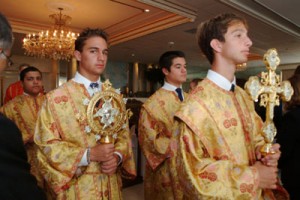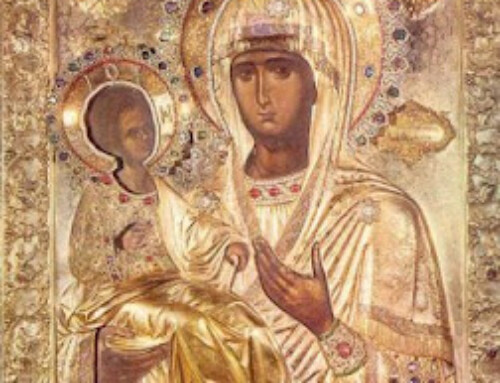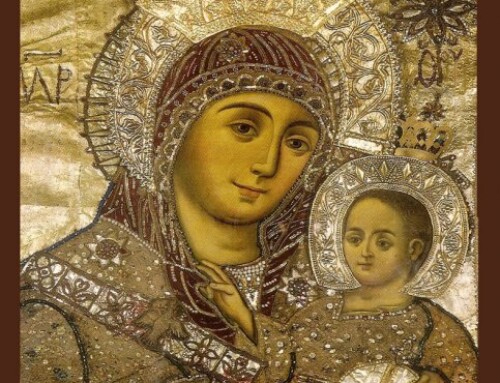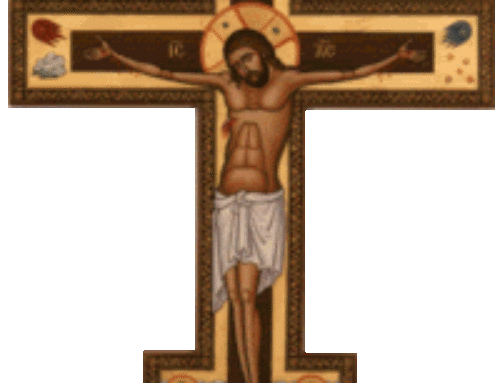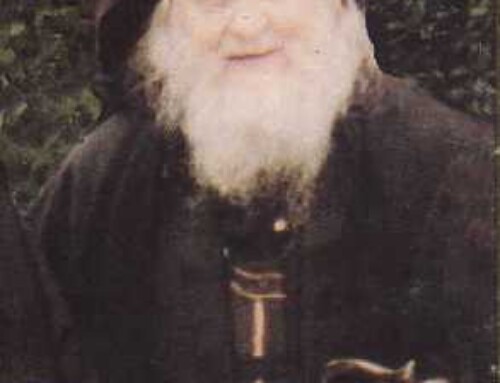“My soul shall exult in the Lord for He hath endowed me with the robe of salvation and with the garment of joy hath He clothed me. He hath set a crown upon my head like unto a bridegroom, and as a bride hath He adorned me with comeliness”
This is the beautiful prayer for use when putting on the Stikhar. It speaks eloquently of the great honor and privilege which is given to those who serve in the Sanctuary. The Stikhar is then, a special garment, one which sets the acolyte aside, marking him for the important role of assisting the clergy at the various services of the liturgical year, most importantly at the Divine Liturgy. It is a central tenet of our Orthodox Faith, that the gifts of bread and wine become the very Body and Blood of Our Lord and Savior Jesus Christ. The Sanctuary, behind the Iconostas, is the physical place where this occurs, and the Sanctuary is then the dwelling place of Christ Jesus on earth. If we try to maintain an awareness of this as we serve, our actions will be reverent, respectful and careful as we can make them.
Following are some rules of conduct to help acolytes assist clergy in the celebration of the Divine Mysteries:
- 1. TIMELINESS: It is preferable that you arrive during the reading of the Hours if you are to serve at the Divine Liturgy. During this time period the clergy are performing the Office of Oblation, preparing the Gifts. Under no circumstances will you be able to serve if you arrive after the reading of the Epistle.
- 2. STAND IN THE SANCTUARY: Stand reverently, not leaning against walls or in doorways and do not sit on steps, boxes in the vestment closet, benches or chairs in the sacristies. If you feel ill, you may need to sit down. If the illness persists, get the Priest’s blessing, remove the Stikhar and leave the Sanctuary/sacristy.
- 3. WALK, DON’T RUN: And walk only when you are doing something to assist in the Service such as light candles, get Ripidi, Kadilo(censer), Prosfori, assist Celebrant in hand washing, etcetera. There is no need to walk back and forth simply for the sake of walking.
- 4. TALK ONLY WHEN NECESSARY: And direct questions to the senior acolyte, to the Proto-deacon if there is no senior server and lastly to the Celebrant if neither a senior acolyte nor Deacon is present. Talking should always be kept to a minimum and should be in a low tone. At no time should there be loud laughter, loud talk or rough housing in the Church never mind in the Sanctuary or sacristies.
- 5. HANDLE CANDLES AND KADILO CAREFULLY: Always be careful with lighted candles and the Kadilo. Hold candles upright, don’t tilt them over and you will avoid getting hot wax on your head, hands, Stikhar, floor and shoes. As most are aware, hot wax burns and the cold variety is difficult to remove from skin, hair and clothing. Never play with the candle; that is, don’t stick fingers into the wax, press down the wick, or wave the candle around. Blow out the candle in the Sacristy, not in the Sanctuary. The exception is the large candle which remains in the Sanctuary. Three half sections of charcoal are adequate for the Kadilo. A scant one quarter t spoon of incense suffices. If the Protodeacon or Celebrant wants more incense, he will add it from the boat (incense receptacle on the stand behind the Altar) or ask you to put more in. Try to avoid touching the Kadilo receptacle where the coals are. Don’t touch anything except the chains and control rings at the top as these will give you the leverage needed to raise the lid and put in coals and incense.
- 6. PREPARING WINE AND WATER: Only the oldest acolyte should prepare the wine and water for the Communicants. It does not take two people to prepare the tray although moving the tray and stand outside does go more smoothly if two people are involved, one holding the door open while the other does the carrying outside to the assigned place. It is adequate to test the temperature of the wine and water by touching the outside of the vessel. Under no circumstances should the wine or wine and water be sampled either before or after the Communion when the tray has been returned to the sacristy.- Mix only as much wine and water as is needed for the Communicants. There will be times when you over-estimate, but with time and experience one learns to guess fairly accurately how much is required. Leftover wine and water should be poured into cups for the Celebrants and the rest dumped, not consumed in the sacristy.
- 7. PROSFORI: Should be brought up from the candle counter at regular intervals usually every five minutes or so. Walk slowly to and from your destinations. It is preferable that acolytes take turns in carrying out this duty.
- 8. LEAVING THE SACRISTY: After getting the Celebrant’s blessing and going to the sacristy, remove the Stikhar and hang it carefully in the vestment closet. If you can’t reach the hanging bar, ask an older taller person to do .it for you. Under no circumstances leave the Stikhar lying on the floor.
No-one expects that those who serve will be robots. We all have our individual characteristics, strengths and weaknesses. We are acolytes because we want to be and want to serve as best we can. No-one will fault us for mistakes or errors of judgment. Certainly the rule of Christian love and kindness should be nowhere more evident than in the dwelling of the Lord Jesus Himself. The rule of Charity also demands, however, that we act in a dignified and respectful manner, recognizing the seriousness of what we are about as we assist at the Sacred Mysteries. Our role is essential in the conduct of the Liturgy as our assistance al lows the Clergy to concentrate with minimal distraction on praying and carrying out the various actions in the Divine Liturgy and other Services. May the Lord bless all of us in our efforts to serve.
http://www.stjohndc.org/Russian/liturgy/archive/e_acolyte.htm

